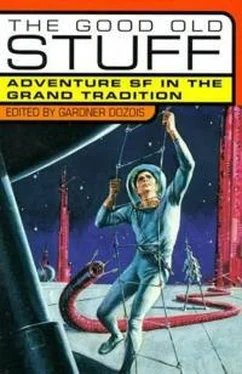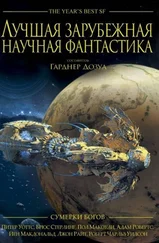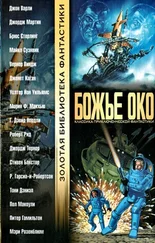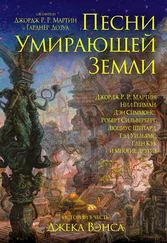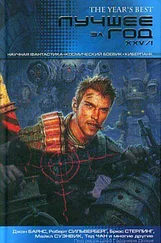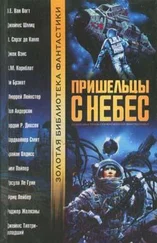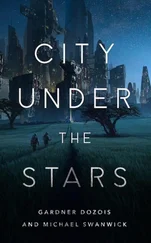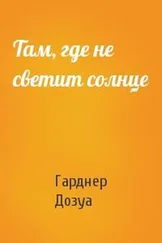Гарднер Дозуа - The Good Old Stuff
Здесь есть возможность читать онлайн «Гарднер Дозуа - The Good Old Stuff» весь текст электронной книги совершенно бесплатно (целиком полную версию без сокращений). В некоторых случаях можно слушать аудио, скачать через торрент в формате fb2 и присутствует краткое содержание. Год выпуска: 1998, ISBN: 1998, Издательство: St. Martin's Griffin, Жанр: Фантастика и фэнтези, на английском языке. Описание произведения, (предисловие) а так же отзывы посетителей доступны на портале библиотеки ЛибКат.
- Название:The Good Old Stuff
- Автор:
- Издательство:St. Martin's Griffin
- Жанр:
- Год:1998
- ISBN:0-312-19275-4
- Рейтинг книги:3 / 5. Голосов: 1
-
Избранное:Добавить в избранное
- Отзывы:
-
Ваша оценка:
- 60
- 1
- 2
- 3
- 4
- 5
The Good Old Stuff: краткое содержание, описание и аннотация
Предлагаем к чтению аннотацию, описание, краткое содержание или предисловие (зависит от того, что написал сам автор книги «The Good Old Stuff»). Если вы не нашли необходимую информацию о книге — напишите в комментариях, мы постараемся отыскать её.
The Good Old Stuff — читать онлайн бесплатно полную книгу (весь текст) целиком
Ниже представлен текст книги, разбитый по страницам. Система сохранения места последней прочитанной страницы, позволяет с удобством читать онлайн бесплатно книгу «The Good Old Stuff», без необходимости каждый раз заново искать на чём Вы остановились. Поставьте закладку, и сможете в любой момент перейти на страницу, на которой закончили чтение.
Интервал:
Закладка:
“Duani!” I called, and ran forward but she did not turn in her place in the line. And I saw that she was weeping.
Rhul turned toward me, and his look had a weary contempt that was bitterer than a curse. “Of what use, after all, to kill you now?”
“But I did this thing! I did it!”
“You are only human.”
The long line shuffled on and Duani’s little feet were closer to that final doorway. Rhul looked upward at the sky. “There is still time before the sunrise. The women at least will be spared the indignity of spears.”
“Let me go with her!”
I tried to follow her, to take my place in line. And the weapon in Rhul’s hand moved and there was the pain and I lay as Conn had lain while they went silently on into the Place of Sleep.
The barbarians found me when they came, still half doubtful, into the city after dawn. I think they were afraid of me. I think they feared me as a wizard who had somehow destroyed all the folk of Shandakor.
For they broke my chains and healed my wounds and later they even gave me out of the loot of Shandakor the only thing I wanted—a bit of porcelain, shaped like the head of a young girl.
I sit in the Chair that I craved at the University and my name is written on the roll of the discoverers. I am eminent, I am respectable—I, who murdered the glory of a race.
Why didn’t I go after Duani into the Place of Sleep? I could have crawled! I could have dragged myself across those stones. And I wish to God I had. I wish that I had died with Shandakor!
Exploration Team
Murray Leinster
“Murray Leinster” was one of the writing names used by the late William Fitzgerald Jenkins, who also wrote as “Will F. Jenkins” and employed another half-dozen pseudonyms. Although he wrote copiously in many other fields, turning out millions of words of pulp stories, little of it other than the science fiction work he produced as Murray Leinster is known today—and, in fact, little outside of his SF work gained much attention even during his lifetime. As Murray Leinster, though, Jenkins had a profound and lasting effect on the development of modern science fiction.
“Leinster” sold his first SF story to Argosy in 1919, had work published in Hugo Gernsback’s Amazing during the 20s, and went on to be one of the mainstays of John W. Campbell’s “Golden Age” Astounding in the ‘40s and ‘50s, where most of his best work appeared. Most of Leinster’s novels are heavily dated and long forgotten—one of the few figures of the day who made his reputation almost entirely on his short fiction, he was somehow never able to make much of an impact with his novels, which were widely regarded as inferior to his short work even during his working lifetime—but the best of his short stories remain fresh and powerful today. In his short work, Leinster more or less invented several subgenres still active today: for instance, he is credited with writing one of the first Alternate History stories, “Sideways In Time,” and one of the earliest First Contact stories, the famous “First Contact,” and both stories still hold up as among the best treatments of their subjects. Also among his most famous stories is the taut, suspenseful, and scary tale that follows, “Exploration Team,” which won Leinster his only Hugo Award in 1956, and which is practically the model of how to write an intricate and intelligent adventure set on an alien world, a story which has been an influence on—if not indeed the inspiration for—countless other stories and novels, as well as television shows and movies, over the years. Nobody before Leinster had ever written the tale of Terran explorers battling a hostile alien planet any better than he wrote it here—and, you know what? Forty years later, nobody has done it any better yet.
Leinster’s best novel is probably The Wailing Asteroid , above-average among Leinster novels for imagination and evocativeness, with some quirky detail work that holds up fairly well. His other novels include The Pirates of Zan, The Forgotten Planet, The Greks Bring Gifts , and The War with the Gizmos . “Exploration Team” was collected, with other Survey Team stories, as Colonial Survey , one of his best collections.
His “Med Service” series—not as successful as his Survey Team stories, but still of interest—was collected in S.O.S. from Three Worlds and Doctor to the Stars ; there were also two Med Service novels, The Mutant Weapon and This World Is Taboo . Other Leinster collections include Monsters and Such and The Best of Murray Leinster .
Almost all of Leinster’s books are long out-of-print, and almost impossible to find; you probably have the best chance of finding The Best of Murray Leinster , published in 1978, in a used-book store, but even that’s rather unlikely these days. Fortunately, NESFA Press has just brought out a big retrospective anthology of his work, First Contacts: The Essential Murray Leinster (NESFA Press, P.O. Box 809, Framingham, MA 07101-0203, $27), which features most of his best stories. Buy it while you still can, since much of this work is unfindable anywhere else.
A multi-talented man, Will Jenkins, the person behind the Murray Leinster mask, was a successful inventor as well as an author, having created, among other things, a front-projection method for filming backgrounds still used in the film industry today, where it is known as the “Leinster Projector.” During World War II, he also came up with an ingenious method for disguising the wake left by submarine periscopes that probably saved the lives of thousands of submarine sailors over the course of the war. He died in 1975.
The nearer moon went by overhead. It was jagged and irregular in shape, and was probably a captured asteroid. Huyghens had seen it often enough, so he did not go out of his quarters to watch it hurtle across the sky with seemingly the speed of an atmosphere-flier, occulting the stars as it went. Instead, he sweated over paper work, which should have been odd because he was technically a felon and all his labors on Loren Two felonious.
It was odd, too, for a man to do paper work in a room with steel shutters and a huge bald eagle—untethered—dozing on a three-inch perch set in the wall. But paper work was not Huyghens’ real task.
His only assistant had tangled with a night-walker and the furtive Kodius Company ships had taken him away to where Kodius Company ships came from. Huyghens had to do two men’s work in loneliness. To his knowledge, he was the only man in this solar system.
Below him, there were snufflings. Sitka Pete got up heavily and padded to his water pan. He lapped the refrigerated water and sneezed violently.
Sourdough Charley waked and complained in a rumbling growl. There were divers other rumblings and mutterings below. Huyghens called reassuringly, “Easy there? and went on with his work. He finished a climate report, and fed figures to a computer, and while it hummed over them he entered the inventory totals in the station log, showing what supplies remained. Then he began to write up the log proper.
“Sitka Pete,” he wrote, “has apparently solved the problem of killing individual sphexes. He has learned that it doesn’t do to hug them and that his claws can’t penetrate their hide—not the top hide, anyhow.
Today Semper notified us that a pack of sphexes had Found the scent-trail to the station. Sitka hid downwind until they arrived.
Then he charged from the rear and brought his paws together on both sides of a sphex' head in a terrific pair of slaps. It must have been like two twelve-inch shells arriving from opposite directions at the same time. It must have scrambled the sphex brains as if they were eggs. It dropped dead. He killed two more with such mighty pairs of wallops. Sourdough Charley watched, grunting, and when the sphexes turned on Sitka, he charged in his turn. I, of course, couldn’t shoot too close to him, so he might have fared badly but that Faro Nell came pouring out of the bear quarters to help. The diversion enabled Sitka Pete to resume the use of his new technic, towering on his hind legs and swinging his paws in the new and grisly fashion. The fight ended promptly. Semper flew and screamed above the scrap, but as usual did not join in. Note: Nugget, the cub, tried to mix in but his mother cuffed him out of the way. Sourdough and Sitka ignored him as usual.
Читать дальшеИнтервал:
Закладка:
Похожие книги на «The Good Old Stuff»
Представляем Вашему вниманию похожие книги на «The Good Old Stuff» списком для выбора. Мы отобрали схожую по названию и смыслу литературу в надежде предоставить читателям больше вариантов отыскать новые, интересные, ещё непрочитанные произведения.
Обсуждение, отзывы о книге «The Good Old Stuff» и просто собственные мнения читателей. Оставьте ваши комментарии, напишите, что Вы думаете о произведении, его смысле или главных героях. Укажите что конкретно понравилось, а что нет, и почему Вы так считаете.
